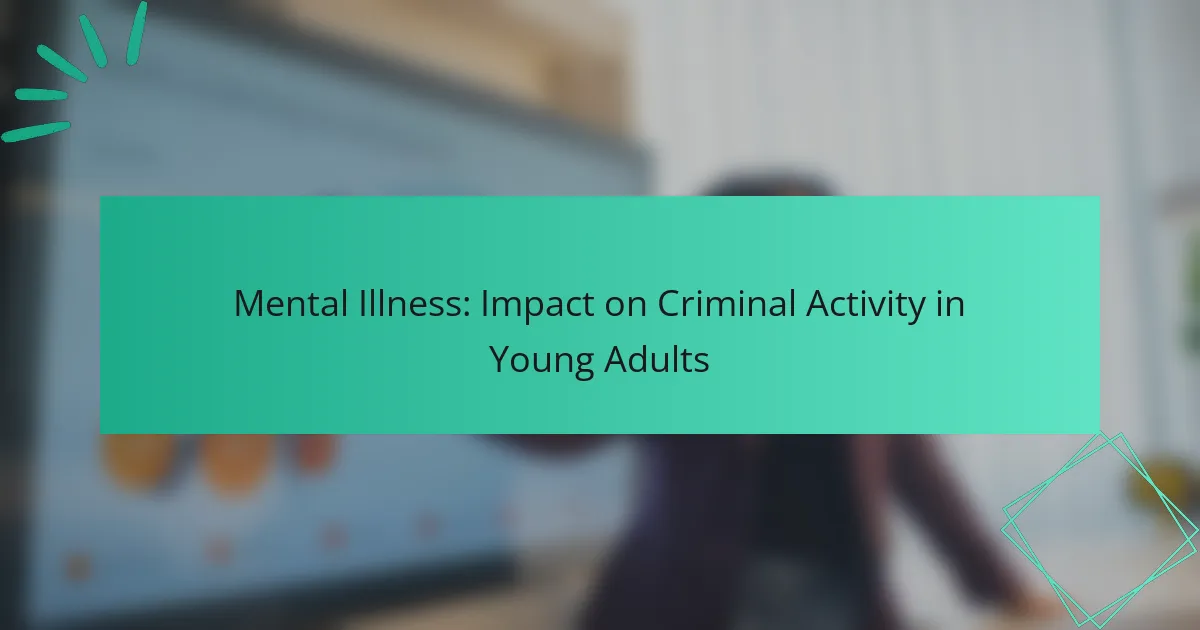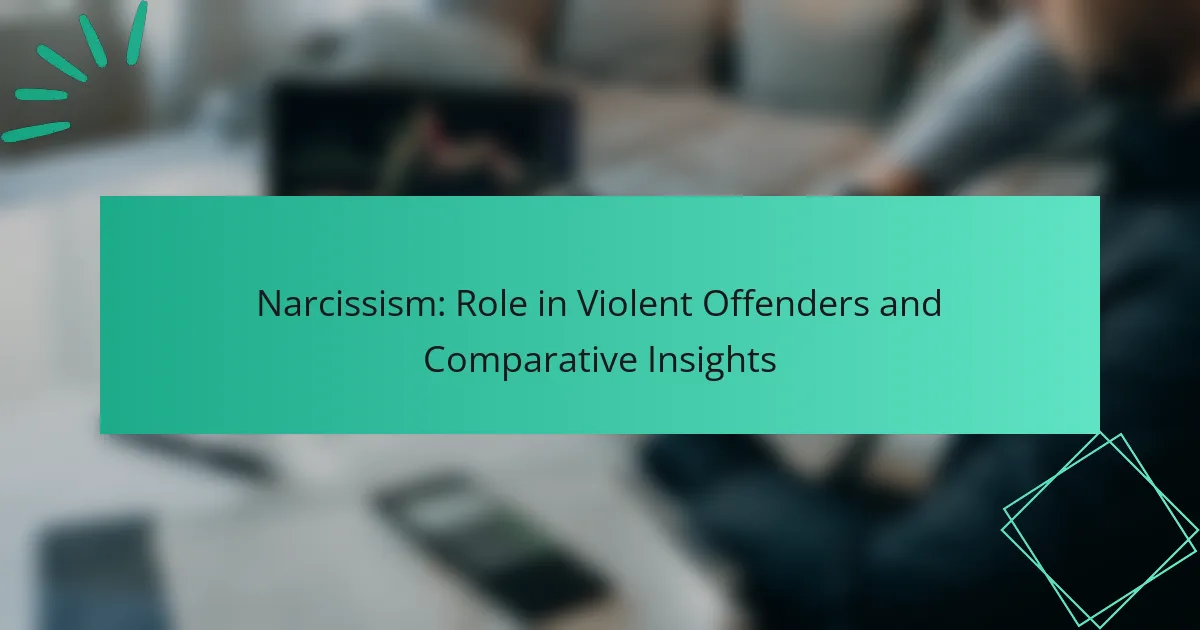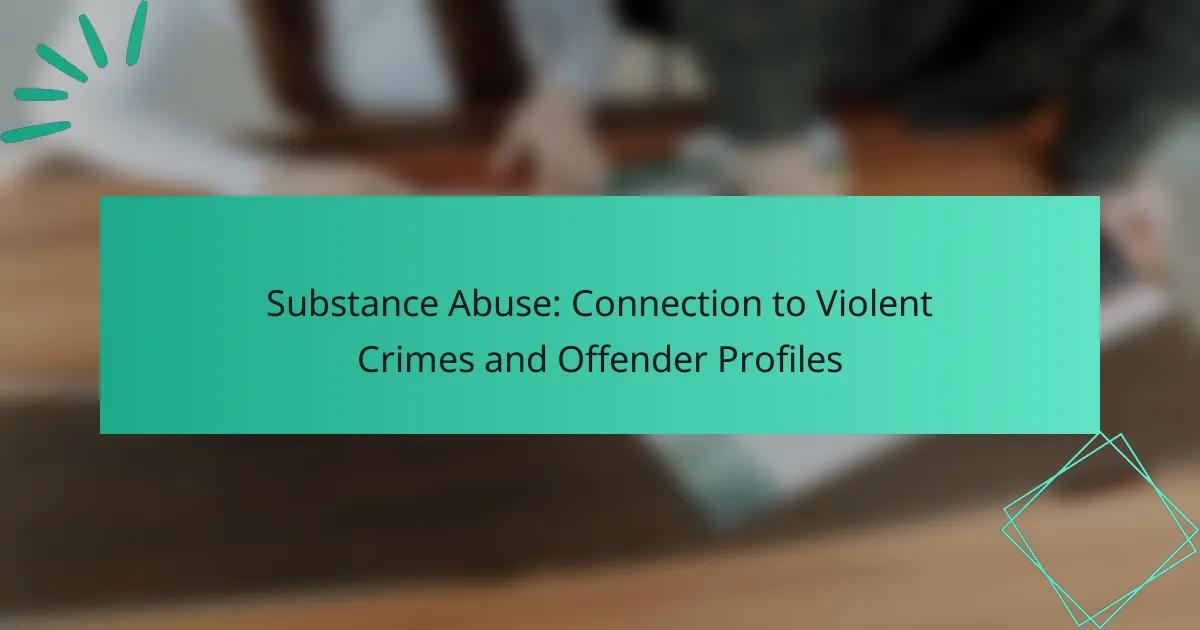Mental illness plays a critical role in shaping criminal behavior among young adults, often leading to impulsive and aggressive actions. Conditions such as depression, anxiety disorders, and schizophrenia can significantly influence decision-making, increasing the risk of criminal activity. Addressing these mental health challenges through targeted interventions and community support is essential for reducing crime and fostering healthier societal integration.
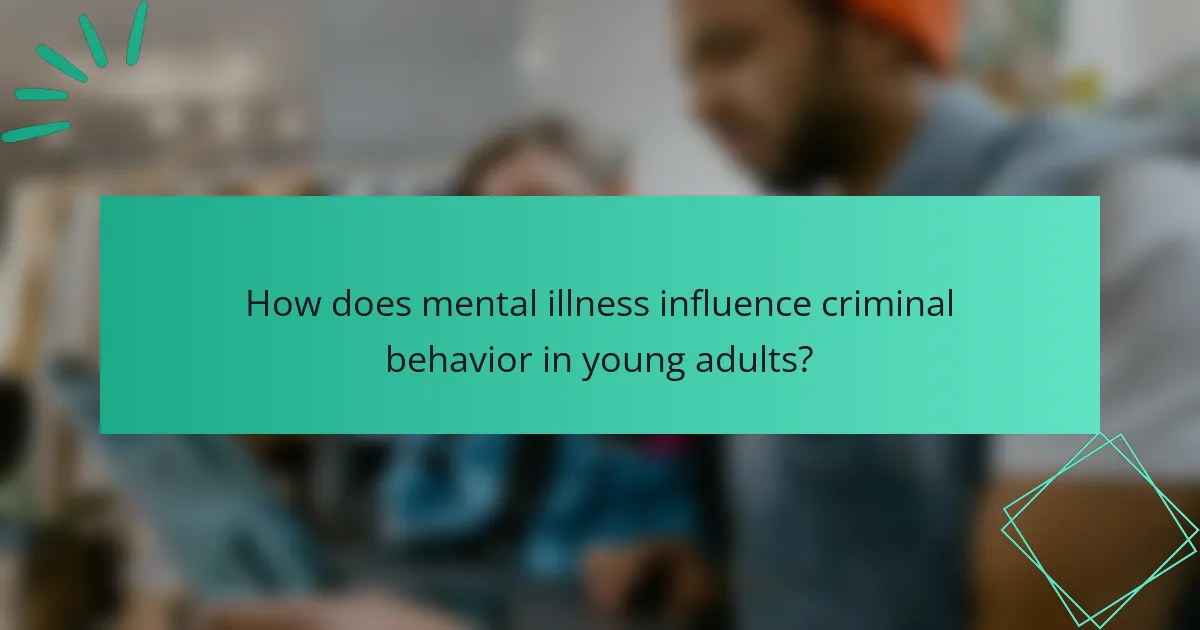
How does mental illness influence criminal behavior in young adults?
Mental illness can significantly affect criminal behavior in young adults by increasing the likelihood of impulsive actions and aggressive tendencies. Understanding these influences is crucial for developing effective prevention and intervention strategies.
Increased impulsivity and aggression
Younger individuals with mental health issues often exhibit heightened impulsivity and aggression, which can lead to criminal activities. Conditions such as ADHD or bipolar disorder may impair judgment, causing individuals to act without considering the consequences.
For example, a young adult experiencing a manic episode might engage in reckless behavior, including theft or vandalism, due to a lack of self-control. Recognizing these patterns can help in creating targeted support systems.
Link to substance abuse
Mental illness is frequently linked to substance abuse, which can exacerbate criminal behavior. Young adults may turn to drugs or alcohol as a coping mechanism, leading to impaired decision-making and increased risk of engaging in illegal activities.
Research indicates that a significant percentage of young offenders have co-occurring substance use disorders and mental health conditions. Addressing both issues simultaneously is essential for effective rehabilitation.
Impact of untreated mental health conditions
Untreated mental health conditions can lead to a higher risk of criminal behavior among young adults. Without proper care, symptoms may worsen, resulting in increased distress and potential criminal actions as a maladaptive response.
For instance, a young adult with untreated depression may resort to theft to fund substance use or escape from their emotional pain. Early intervention and access to mental health services are crucial in preventing such outcomes.
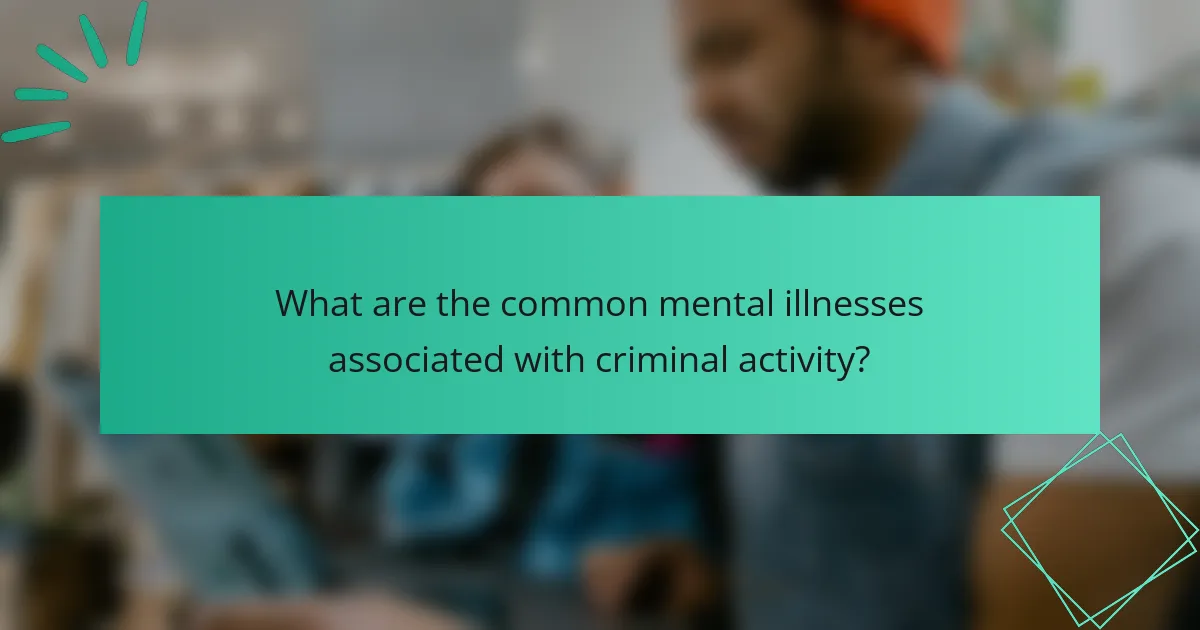
What are the common mental illnesses associated with criminal activity?
Common mental illnesses linked to criminal activity include depression, anxiety disorders, and schizophrenia. These conditions can significantly influence behavior, potentially leading to criminal acts under certain circumstances.
Depression and its effects
Depression can lead to feelings of hopelessness and despair, which may result in impulsive or reckless behavior. Young adults experiencing severe depression might engage in criminal activities as a means of coping or expressing their emotional pain.
Additionally, depressed individuals may struggle with decision-making and impulse control, increasing the likelihood of engaging in illegal acts. It’s crucial to recognize these signs early and seek appropriate mental health support to mitigate risks.
Anxiety disorders and crime
Anxiety disorders can manifest in various ways, including panic attacks and obsessive-compulsive behaviors, which may lead to criminal activity. For instance, individuals with severe anxiety might resort to theft or fraud as a misguided attempt to alleviate their stress or financial burdens.
Moreover, heightened anxiety can impair judgment and lead to aggressive behaviors in stressful situations. Addressing anxiety through therapy and medication can help reduce the risk of criminal behavior among affected individuals.
Schizophrenia and violent behavior
Schizophrenia is a severe mental illness that can distort a person’s perception of reality, sometimes resulting in violent behavior. Young adults with untreated schizophrenia may act on delusions or hallucinations, which can lead to criminal acts.
While not all individuals with schizophrenia are violent, the risk increases when symptoms are unmanaged. Early intervention and consistent treatment are essential to help individuals manage their condition and reduce the likelihood of engaging in criminal activities.
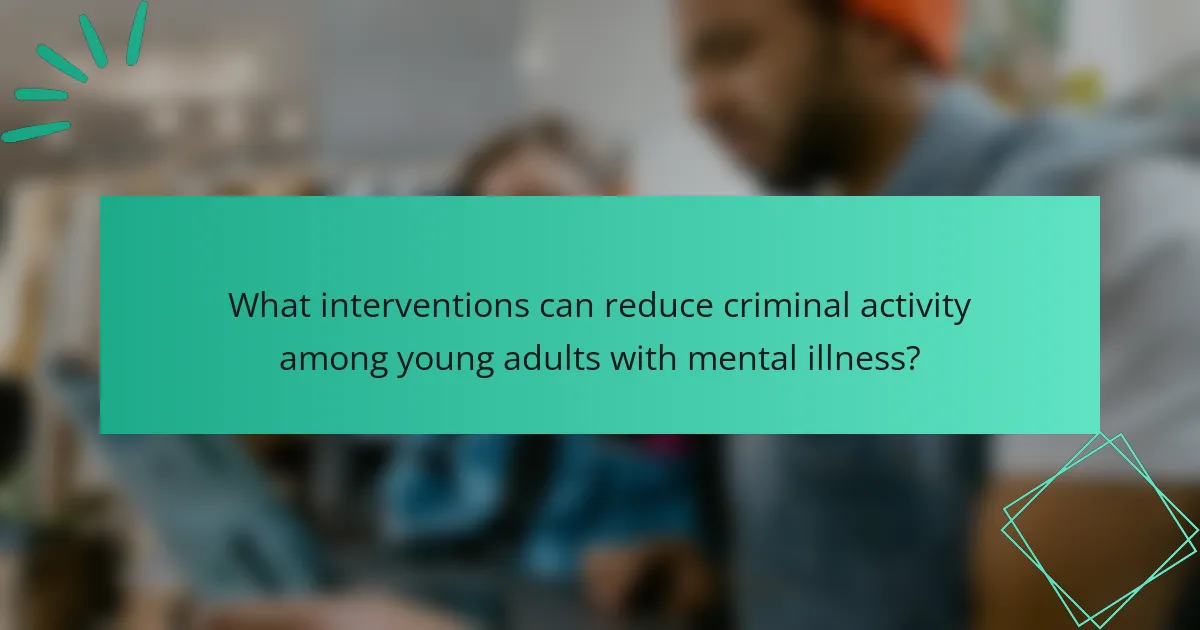
What interventions can reduce criminal activity among young adults with mental illness?
Interventions that effectively reduce criminal activity among young adults with mental illness include therapeutic programs, community support initiatives, and education and awareness campaigns. These strategies aim to address underlying mental health issues while promoting social integration and understanding.
Therapeutic programs
Therapeutic programs, such as cognitive-behavioral therapy (CBT) and dialectical behavior therapy (DBT), focus on helping individuals manage their mental health symptoms and improve coping strategies. These programs often involve individual or group sessions that provide a supportive environment for young adults to express their feelings and learn problem-solving skills.
Incorporating family therapy can also enhance the effectiveness of these programs by fostering better communication and understanding among family members. Many community health centers offer sliding scale fees for therapy, making it accessible to those with limited financial resources.
Community support initiatives
Community support initiatives, such as peer support groups and mentorship programs, play a crucial role in reducing criminal activity. These initiatives create networks of support that help young adults feel connected and understood, which can decrease feelings of isolation and frustration.
Local organizations may provide resources like job training, housing assistance, and recreational activities, which can further reduce the likelihood of criminal behavior by promoting stability and engagement in positive activities. Engaging with local nonprofits can help identify available resources tailored to specific community needs.
Education and awareness campaigns
Education and awareness campaigns aim to reduce stigma surrounding mental illness and promote understanding of its impact on behavior. These campaigns can take the form of workshops, public service announcements, or school programs that educate both young adults and the general public about mental health issues.
Effective campaigns often involve collaboration with mental health professionals and community leaders to ensure accurate information is disseminated. By fostering a more informed community, these initiatives can encourage early intervention and support for young adults at risk of engaging in criminal activity.
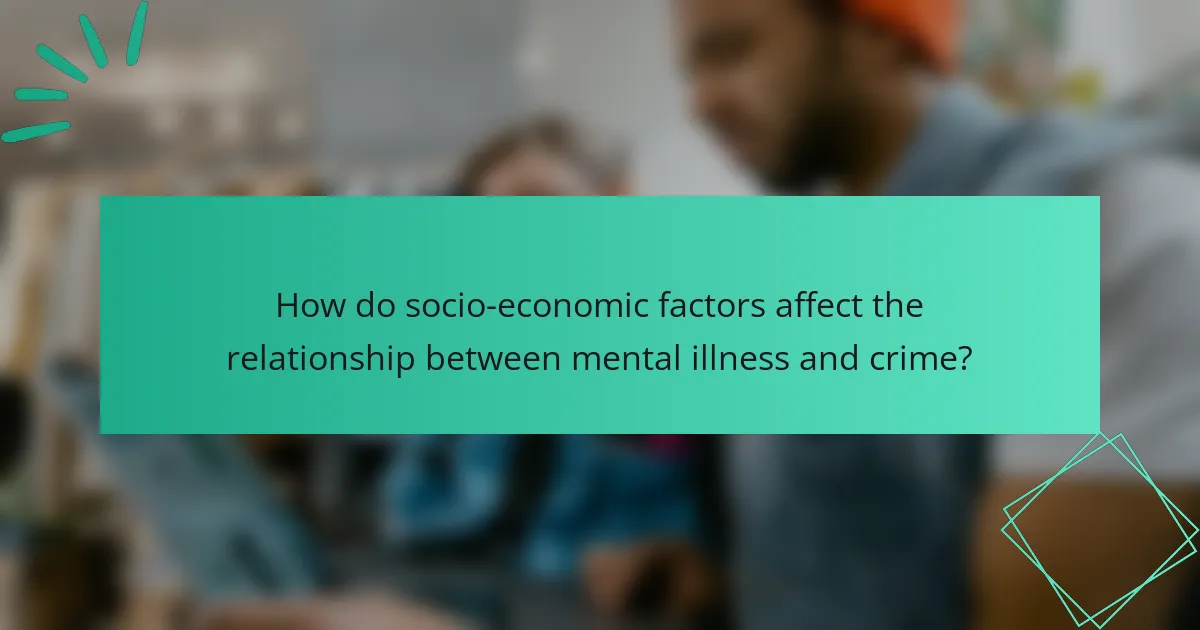
How do socio-economic factors affect the relationship between mental illness and crime?
Socio-economic factors significantly influence the connection between mental illness and criminal behavior. Individuals from lower socio-economic backgrounds may face increased stressors that exacerbate mental health issues, potentially leading to higher crime rates.
Poverty and crime rates
Poverty is closely linked to higher crime rates, particularly among young adults. Limited financial resources can lead to desperation, which may drive individuals to commit crimes as a means of survival. Additionally, those living in poverty often experience heightened levels of stress and mental health challenges, further increasing the likelihood of criminal behavior.
Research indicates that areas with high poverty levels tend to have elevated crime rates, particularly violent crimes. For example, neighborhoods with unemployment rates above 10% often see a significant rise in criminal activity compared to those with stable employment opportunities.
Access to mental health services in urban areas
Access to mental health services is crucial in urban areas, where many young adults may struggle with mental illness. In cities, the availability of resources can vary widely, affecting treatment outcomes. Areas with limited mental health facilities often see a correlation with increased crime rates, as untreated mental health issues can lead to criminal behavior.
For effective intervention, urban planners and policymakers should prioritize mental health services in high-crime neighborhoods. Enhancing access to affordable therapy and counseling can help mitigate the impact of mental illness on crime, ultimately fostering safer communities.
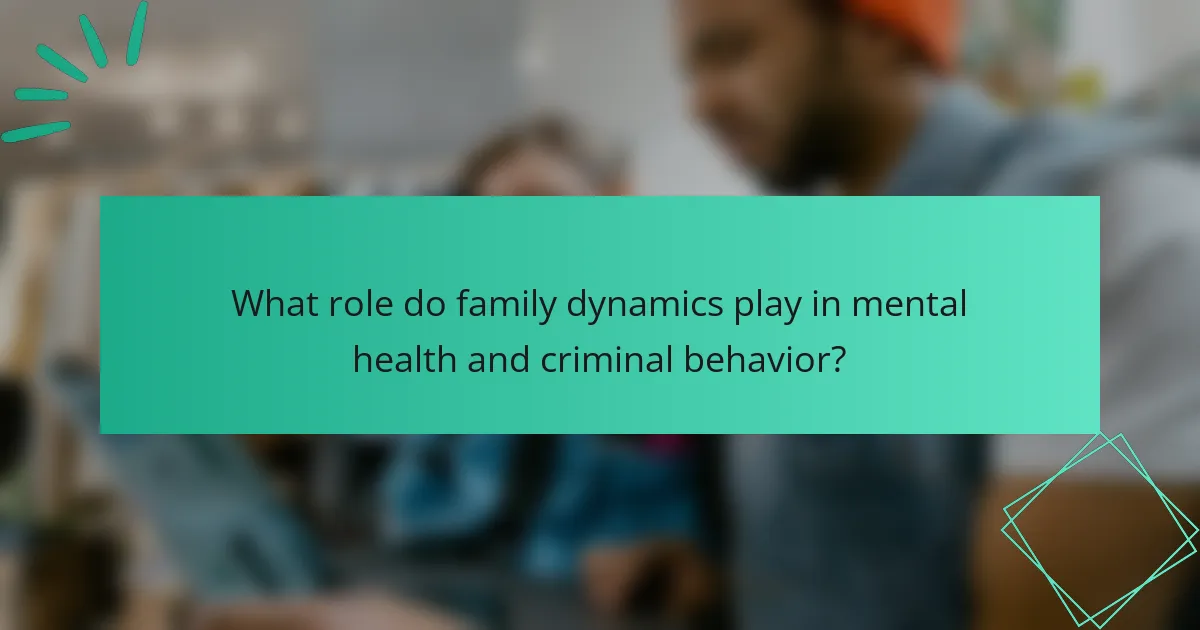
What role do family dynamics play in mental health and criminal behavior?
Family dynamics significantly influence mental health and can contribute to criminal behavior in young adults. Supportive family environments can foster resilience, while dysfunctional dynamics may exacerbate mental health issues, leading to increased risk of criminal activity.
Impact of family history on mental illness
Family history plays a crucial role in the development of mental illness. Genetic predispositions can be inherited, making individuals more vulnerable to conditions such as depression, anxiety, or schizophrenia. Understanding a family’s mental health history can help identify at-risk youth and guide early intervention strategies.
Moreover, environmental factors within the family, such as trauma or substance abuse, can further compound these risks. Young adults with a family background of mental illness may experience higher levels of stress, which can lead to maladaptive behaviors, including criminal activity.
Parental involvement and youth behavior
Parental involvement is a key factor in shaping youth behavior and mental health outcomes. Active engagement from parents, including open communication and emotional support, can significantly reduce the likelihood of delinquency and promote positive mental health. Conversely, neglect or lack of supervision can lead to increased risk of criminal behavior.
Research indicates that consistent parental monitoring and positive reinforcement can help guide young adults towards healthier choices. Parents should strive to create a nurturing environment that encourages emotional expression and provides clear boundaries to mitigate the risk of criminal activity.
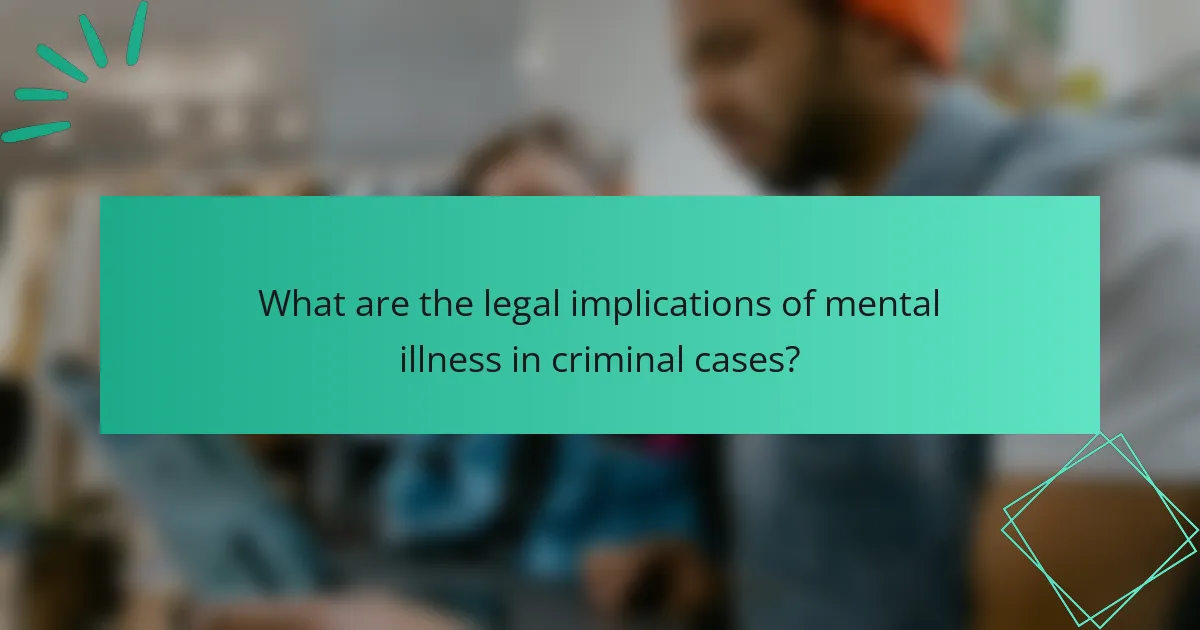
What are the legal implications of mental illness in criminal cases?
The legal implications of mental illness in criminal cases often revolve around the defendant’s ability to understand their actions and the consequences. Courts may consider mental health evaluations to determine if an individual can be held criminally responsible or if they require treatment instead of punishment.
Insanity defense in the UK
In the UK, the insanity defense allows individuals to plead not guilty due to a mental disorder that prevented them from understanding the nature of their actions. The legal standard is known as the M’Naghten Rule, which states that a defendant must demonstrate they were suffering from a severe mental illness at the time of the offense.
If successful, defendants may be found “not guilty by reason of insanity” and can be subject to treatment in a secure hospital rather than prison. This approach emphasizes rehabilitation over punishment, reflecting a recognition of the complexities of mental health issues.
Sentencing considerations for mentally ill offenders
When sentencing mentally ill offenders, courts often take into account the individual’s mental health status and its impact on their behavior. Judges may opt for alternative sentencing options, such as mandatory treatment programs, instead of traditional incarceration.
Factors such as the severity of the mental illness, the nature of the crime, and the offender’s history of mental health treatment can influence sentencing decisions. This approach aims to address the root causes of criminal behavior while ensuring public safety.
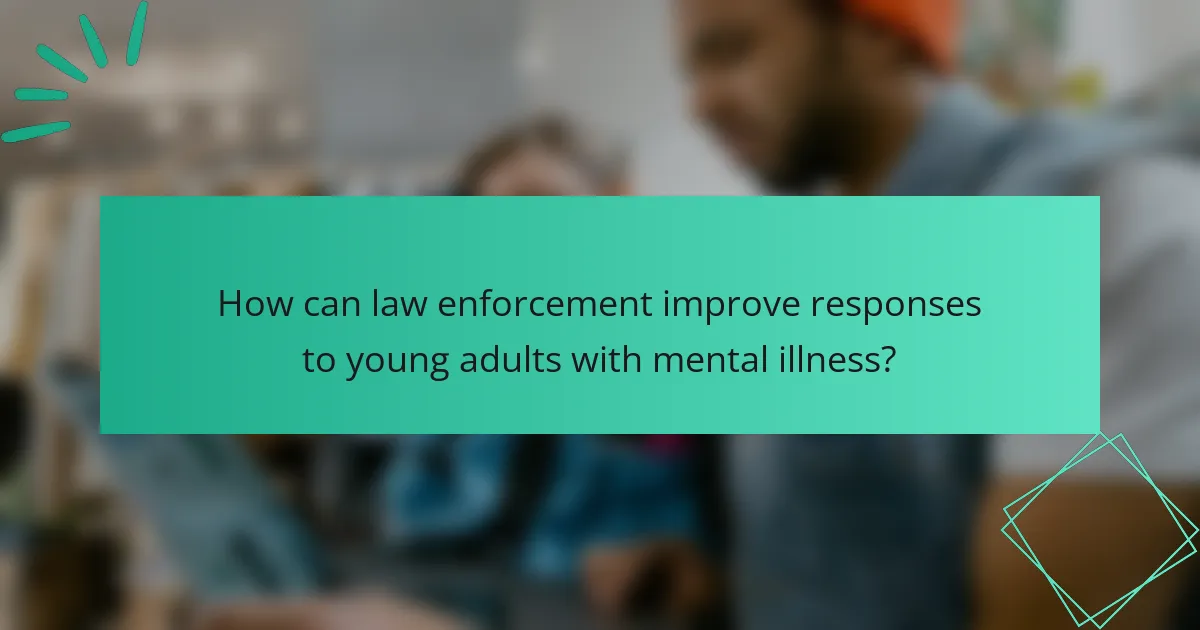
How can law enforcement improve responses to young adults with mental illness?
Law enforcement can enhance their responses to young adults with mental illness by implementing specialized training programs and adopting collaborative approaches with mental health professionals. This ensures officers are equipped to handle situations involving mental health crises effectively and compassionately.
Training for police officers
Training for police officers is crucial in improving interactions with young adults experiencing mental illness. Programs should focus on recognizing signs of mental health issues, de-escalation techniques, and effective communication strategies tailored to individuals in crisis.
Incorporating scenario-based training can help officers practice responses to real-life situations. For instance, role-playing exercises can simulate encounters with individuals exhibiting symptoms of mental illness, allowing officers to develop appropriate responses and reduce the likelihood of escalation.
Additionally, ongoing training and refresher courses can keep officers updated on best practices and emerging mental health trends. Collaborating with mental health organizations can provide valuable resources and support for law enforcement agencies, fostering a community-focused approach to mental health crises.
